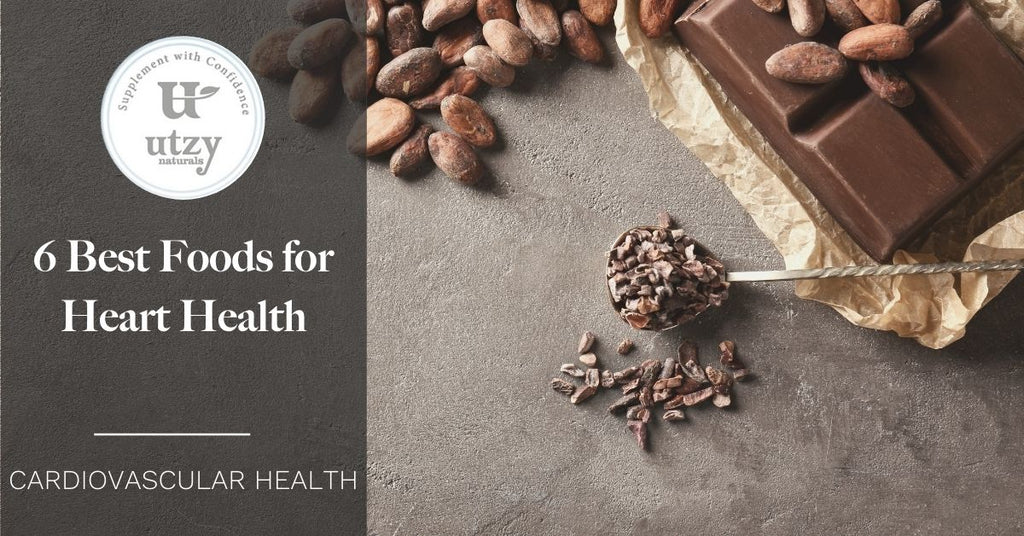Your Cart is Empty
COLLECTIONS:
SPECIAL OFFERS:
LEARN:

6 Best Foods for Heart Health
February 15, 2021 4 min read
Heart disease is the leading cause of death in the United States for both men and women.
Nearly one in every four deaths is caused by heart disease (1).
It’s also very expensive.
The cost of medications, doctor visits, and loss in productivity associated with heart disease can certainly add up. In fact, from 2014-2015, heart disease costs over $200 billion per year, with this number anticipated to increase.
Thankfully, the foods we consume each day can have a positive impact on heart health (2).
This article will talk about the top foods to focus on for a healthy heart, as well as ways to incorporate them.

Top Foods for Heart Health
1. Blueberries
Not only are they delicious, but they’re also packed with compounds called anthocyanins which reduce the risk for heart disease (3).
In fact, studies have found berries to help decrease LDL cholesterol, blood pressure, fasting glucose, and hemoglobin A1C; all of which are markers associated with heart disease (4).
How to incorporate it: Add frozen berries to a morning smoothie, use as a topping for yogurt or oatmeal, or eat as a snack with some nuts.
2. Leafy Greens
Leafy greens such as spinach, kale, or arugula are packed with nutrients including Vitamin A, C, folate, and calcium, which makes them an excellent choice for supporting heart health (5).
They also contain Vitamin K which has been shown to be beneficial for cardiovascular health due to its significant role in blood clotting (6,7).
In addition, spinach contains an antioxidant called coenzyme Q10 (CoQ10) which has been shown to reduce stress in the body and promote heart health. In fact, studies have found that three out of four patients with heart disease have low levels of CoQ10 (8).
How to incorporate it: Incorporate leafy greens into egg bakes, soups, or use for a salad at lunch.
3. Salmon
Is an excellent source of omega-3 fatty acids (both EPA and DHA) which has been shown to help promote heart health by reducing triglycerides, LDL cholesterol, blood pressure, and inflammation (9,10).
In addition, salmon containsVitamin D, which is associated with cardiovascular health support (11).
How to incorporate it: Use wild-caught canned salmon as a quick protein for salads, bake salmon with some dill, lemon and veggies for a delicious dinner option, or try these simpleSalmon Cakes.
Aim for at least 2 servings of fatty fish such as wild-caught salmon each week. If you’re not able to do this, consuming afish oil supplement may be beneficial (12).
4. Extra-Virgin Olive Oil
Is one of the healthiest oils on the planet, and is a staple for the Mediterranean diet due to the variety of health benefits it provides.
It’s primarily made up of monounsaturated fats, which act as antioxidants in the body and promote heart health.
In fact, research has found extra-virgin olive oil to increase heart-healthy HDL cholesterol levels and while decreasing LDL cholesterol levels (13,14).
How to incorporate it: Use extra-virgin olive oil as a dressing on salads, use as a fat in dips such as homemade hummus, or use for low-heat cooking.
5. Beans
Beans such as kidney beans, chickpeas, or pinto beans are high in fiber and resistant starch; which can help lower blood sugars levels and promote heart health. (15)
In fact, one small study found that consuming ½ cup of pinto beans over eight weeks significantly reduced triglyceride and LDL cholesterol levels (16).
Foods high in fiber and resistant starch can also help support a healthy gut microbiome, which can support heart health (17).
How to incorporate it: Add black beans to tacos, pinto or kidney beans to chili and soups, or roast chickpeas in the oven for a crunchy snack on-the-go.
6. Cocoa
You can have a healthy heart and eat your chocolate too! In fact, the health benefits of cocoa dates back over 3,000 years ago (18).
Research has found cocoa to contain several different antioxidants, all of which may provide a variety of health benefits including an improvement in insulin resistance, sun damage, and immunity (19).
Interestingly, some studies have also found that those who consume a moderate amount of cocoa have a lower risk for heart disease compared to those who don’t (20).
Overall, the benefits of moderate cocoa consumption likely outweighs the risk.
How to incorporate it: Sprinkle cocoa nibs on top of yogurt or berries, or use it in these5-Ingredient Peanut Butter Cups.
Conclusion
As you’ve seen, the foods we put on our plate can play a significant role in our health.
Focus on the six foods listed above to support a healthy heart and lower your risk for health complications in the future.
_____________________________________________________________________

Autumn Enloe
MS, RD, LD, CLT
Autumn Enloe is a registered dietitian in Minnesota. She has a private practice where she focuses on helping busy women make their health a priority again through sustainable nutrition, supplement and lifestyle adjustments. She provides remote nutrition coaching and frequently posts free nutrition content and recipes on her Instagram and her website: www.autumnenloe.com
Leave a comment
Comments will be approved before showing up.
Also in Health
Subscribe
Sign up to get the latest on sales, new releases and more …
Join the Utzy Naturals Club!
Sign up and get the latest on sales, new releases, and more...









